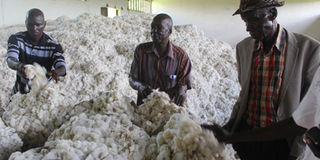Biotech cotton critics must be factual

Members of the Muluanda Cotton Ginnery inspect cotton in a store on October 21, 2015, in Busia County. Burkina Faso cotton farmers made lots of money from Bt cotton. PHOTO | TOM OTIENO | NATION MEDIA GROUP
What you need to know:
- Even more, no one has stopped the “organics or the pseudo-organics” from producing enough maize to help in the alleviation of current food shortages.
- In fact, Africa is losing in the biotechnology revolution after being by-passed by the green and the industrial revolutions.
Any appropriate technology, including biotechnology, that can help Africa grow more cotton and adequate nutritious foods, should be most welcome because the continent thrives on imported used clothing increasingly made from genetically modified cotton (Bt cotton) and imported modified maize.
This trend will continue if we confuse unscientific criticism and fear-mongering with progress with inability to produce adequate food and cash crops like cotton.
A recent article in the Nation on genetically modified cotton in Burkina Faso was misleading and not based on facts as should be expected from anti-biotech groups holding Africa hostage.
Such an article may be new in Kenya but not in Burkina Faso and most of west Africa, especially Ghana and Nigeria, which are going on with genetically modified cotton and maize projects.
Those who have been to Burkina Faso to talk with farmers and the country’s skilled scientists, including biotech experts and regulatory authorities, wonder why such falsehoods and fear-mongering are injected into Africa’s agriculture even if one of the authors is a Burkinabe.
There is a need for readers to know that the only alleged problem with the cotton was the length of the fibre and nothing else.
All the stakeholders, including the monopolistic cotton firms that now want the fibres to be two to three centimetres longer, fully followed all the research in the lab and confined field trials.
Currently, the production of the cotton has been stopped for two years to allow the local breeders come up with longer fibres allegedly needed for making certain “high quality” clothes as dictated by some European firms.
However, the current short ones are still much needed, even within Africa where many would walk naked without imported used clothes that are increasingly made from Bt cotton.
AFRICAMISSING OUT
However much one underestimates Africa’s regulatory authorities and researchers, there is no way livestock could have died after feeding on cotton seeds as scientists just watch.
Burkina Faso cotton farmers made lots of money from Bt cotton and anyone can obtain the financial data from even the three top cotton buying companies in the country and farmers themselves.
Still, these same firms that sold chemicals saw the amount used in spraying against boll-worm decline almost five-fold, meaning farmers saved money, time and minimised poisoning caused by use of lethal agro-chemicals.
The government was definitely put under pressure by the companies, which are also involved in the sale of chemicals and other inputs.
African biotechnology experts, including those in Kenya, say that anti-biotech groups always evade such areas as going to see what goes on in laboratories and confined field trials and other related seeing-is-believing tours.
Even more, no one has stopped the “organics or the pseudo-organics” from producing enough maize to help in the alleviation of current food shortages.
Also, no one has stopped these people from helping boost cotton production so that there is no need for the production of Bt cotton in that market.
Maybe the anti-biotech groups could spend more money helping the regulatory authorities to improve their capacity to credibly detect or deal with any harmful or dangerous GM products instead of repacking and circulating pseudoscience driven by those who think that Africa is too primitive to go for 21st century bio-sciences.
In fact, Africa is losing in the biotechnology revolution after being by-passed by the green and the industrial revolutions.
SAFEGUARD FUTURE
There is a need, therefore, for progressive nations such as Nigeria, Ethiopia, Kenya, Burkina Faso, South Africa, Tanzania, Ghana and Uganda to double their efforts to catch up with the biotechnology revolution as China and India have done.
It would be wonderful for the “organics” to sell their maize to starving people and their dying livestock in northern Kenya before purporting to save Burkina Faso from unproven dangers.
African biotech experts, like their counterparts worldwide, welcome transparent criticism based on proven knowledge.
Despite many setbacks, Africa must move fast to join the biotechnology, energy and digital revolutions.
Otherwise its inhabitants will be endlessly dependent on others.
Mr Owuor is the editor, ScienceAfrica. [email protected]



